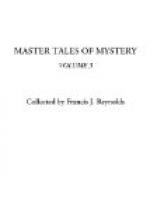“No,” I corrected, “only one, for Miss Lytton was dead when he arrived, according to his latest statement.”
“Very well, then—one. He arrives, Mrs. Boncour is ill, the maid knows nothing at all about it, and Vera Lytton is dead. He, too, smells the ammonia, tastes the headache-powder—just the merest trace—and then he has two patients, one of them himself. We must see him, for his experience must have been appalling. How he ever did it I can’t imagine, but he saved both himself and Mrs. Boncour from poisoning—cyanide, the papers say, but of course we can’t accept that until we see. It seems to me, Walter, that lately the papers have made the rule in murder cases: When in doubt, call it cyanide.”
Not relishing Kennedy in the humor of expressing his real opinion of the newspapers, I hastily turned the conversation back again by asking, “How about the note from Dr. Dixon?”
“Ah, there is the crux of the whole case—that note from Dixon. Let us see. Dr. Dixon is, if I am informed correctly, of a fine and aristocratic family, though not wealthy. I believe it has been established that while he was an interne in a city hospital he became acquainted with Vera Lytton, after her divorce from that artist Thurston. Then comes his removal to Danbridge and his meeting and later his engagement with Miss Willard. On the whole, Walter, judging from the newspaper pictures, Alma Willard is quite the equal of Vera Lytton for looks, only of a different style of beauty. Oh, well, we shall see. Vera decided to spend the spring and summer at Danbridge in the bungalow of her friend, Mrs. Boncour, the novelist. That’s when things began to happen.”
“Yes,” I put it, “when you come to know Danbridge as I did after that summer when you were abroad, you’ll understand, too. Everybody knows everybody else’s business. It is the main occupation of a certain set, and the per-capita output of gossip is a record that would stagger the census bureau. Still, you can’t get away from the note, Craig. There it is, in Dixon’s own handwriting, even if he does deny it: ’This will cure your headache. Dr. Dixon.’ That’s a damning piece of evidence.”
“Quite right,” he agreed hastily; “the note was queer, though, wasn’t is? They found it crumpled up in the jar of ammonia. Oh, there are lots of problems the newspapers have failed to see the significance of, let alone trying to follow up.”
Our first visit in Danbridge was to the prosecuting attorney, whose office was not far from the station on the main street. Craig had wired him, and he had kindly waited to see us, for it was evident that Danbridge respected Senator Willard and every one connected with him.
“Would it be too much to ask just to see that note that was found in the Boncour bungalow?” asked Craig.
The prosecutor, an energetic young man, pulled out of a document-case a crumpled note which had been pressed flat again. On it in clear, deep black letters were the words, just as reported:




